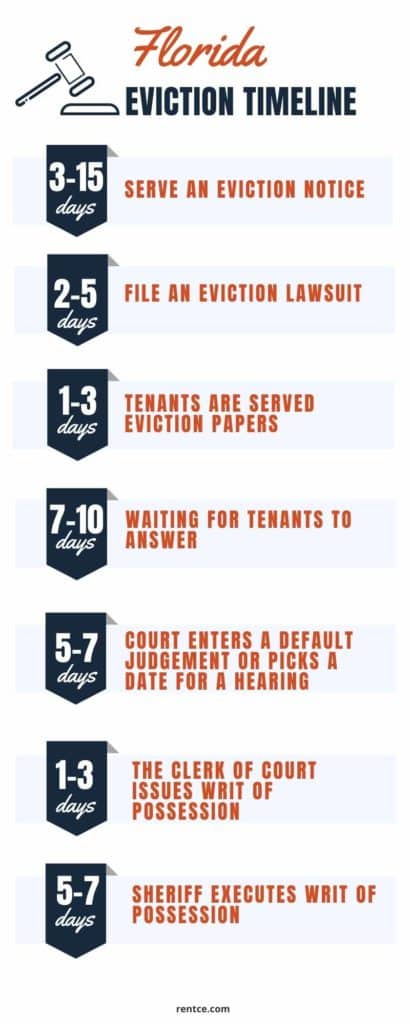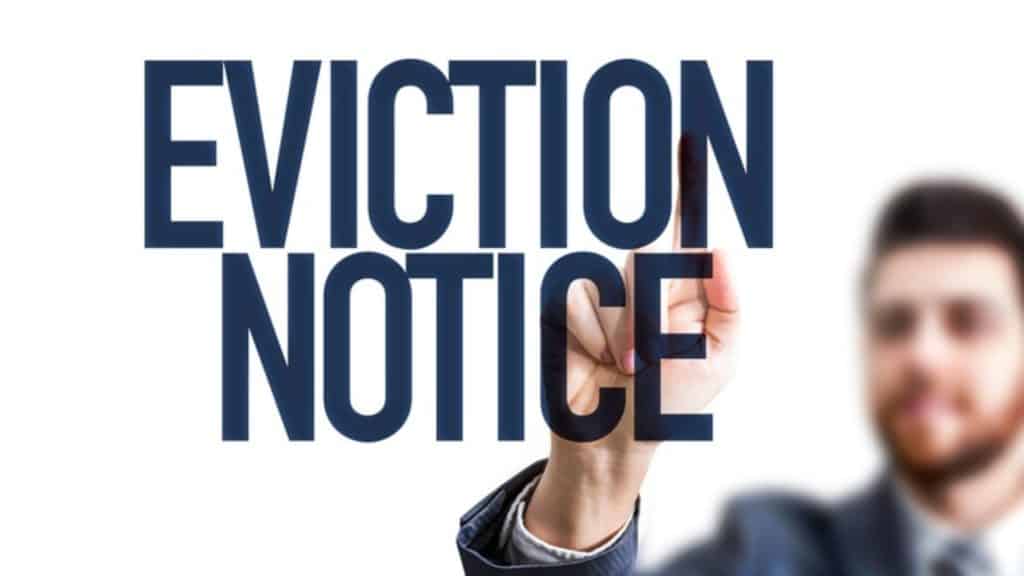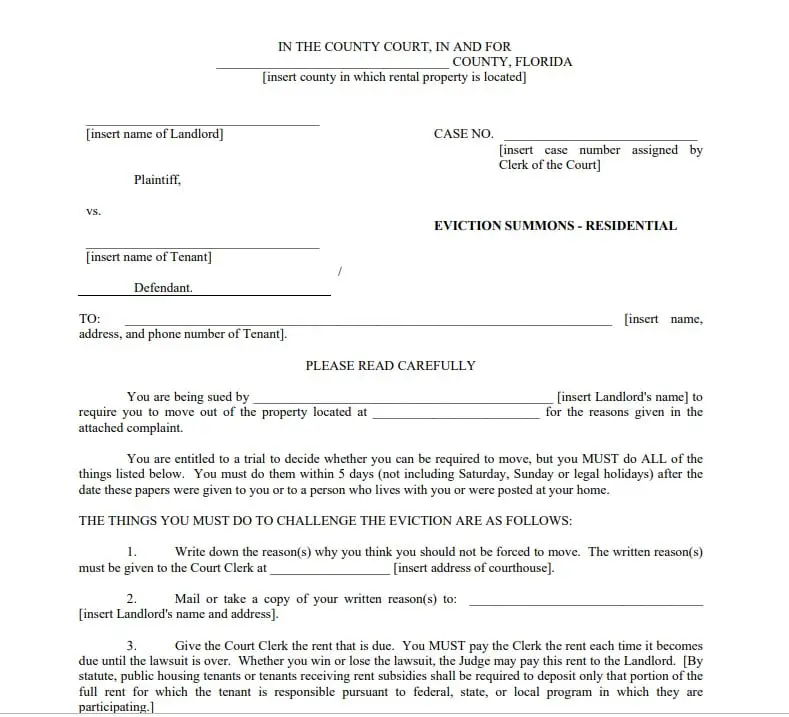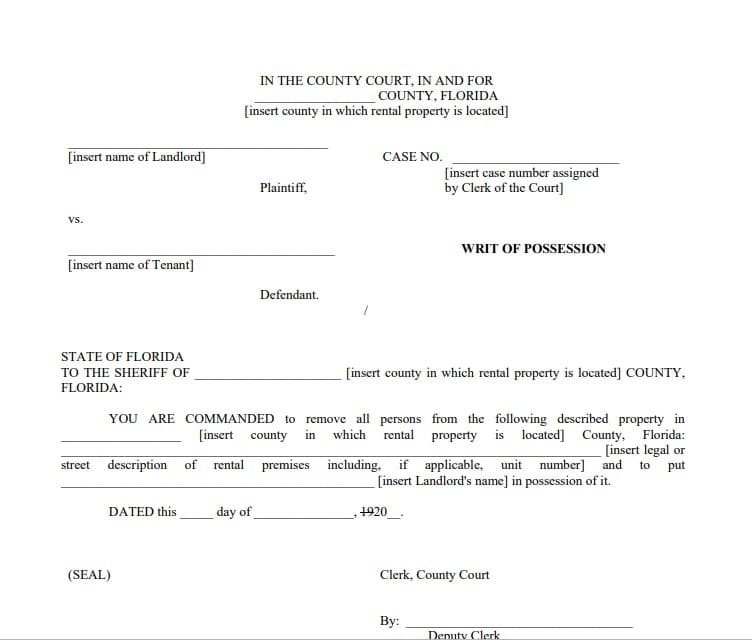
Steps and Timeline of the Eviction Process in Florida [2022 Updates]
Florida is a landlord-friendly state. On average it takes 30 days to evict a tenant if the eviction is not contested (the tenant doesn’t respond to the lawsuit.) Florida law requires a 3-day notice for nonpayment of rent or a 7-day notice for non-compliance with the lease. If the tenant fails to pay rent or cure the non-compliance, the next step is to file a lawsuit. 83.56 Termination of rental agreement
These are the steps and the timeline to evict a tenant in Florida:
- Serve an Eviction Notice [3-15 Days]
- File an Eviction Lawsuit [2-3 Days]
- Tenants are Served Eviction Papers (Court Responsibility) [1-3 Days]
- Waiting for Tenant to Answer [7-10 Days]
- Court Enters a Default Judgement or Picks a Date for a Hearing [5-7 Days]
- The Clerk of Court Issues Writ of Possession [1-3 Days]
- Sheriff Executes Writ of Possession. [5-7 Days]
Current Updates on Florida Evictions [Summer 2022 Update]
The New Stimulus Bill and Emergency Rent Assitance
The New Stimulus Bill will provide some relief for landlords and tenants, $25 billion will be available for rent assistance. The states and counties will provide this assistance to tenants and to landlords on behalf of tenants.
Get more info Florida Emergency Rental Assistance
Eviction Process in Florida
Step 1: Serve a Notice
Time: 3-15 days

There are different reasons to evict a tenant but the most common is nonpayment of rent.
To start the eviction process, the landlord must deliver a 3-Day Notice to the tenants.
When to Serve a Notice?
Give your tenants the notice as soon as the grace period is over. If you include a rule in your Tenant Welcome Letter your tenants will not be surprised when you deliver a Notice, they will expect it.
Where to Get the Notice?
You can get the notice from us, other websites or your lawyer. However, it’s worth mentioning that our forms are free forever and we don’t trick you into free trials and hope that you will forget to cancel.
How to Deliver the Notice?
The Notice can be hand-delivered or mailed. Mailing an eviction notice is tricky because you have to show that the tenant has had three business days to respond to the notice and pay the rent. Even if you mail a Certified letter, the tenant may refuse it and make the whole process longer.
The best way to deliver the Notice is in person. Create the Notice, date it on the same date of delivery, and give it to your tenants. If they are not home, post it on the front door (make sure it’s taped well) and take a photo with a date and time stamp.
Crucial Info When Preparing the Notice
The notice should be addressed to all occupants (including people who may have moved)
The date on the notice should be the date you are serving it
The amount due should be an undisputed Rent amount only. Don’t include late fees or any other fees. Consult an attorney if you want to do that.
Florida Eviction Notices
The 3-Day Notice is served for non-payment of rent. Add an additional 5 days to the due date if you are mailing the notice.
The 8-Day Notice is also served for non-payment of rent if the tenant has to mail the payment (landlord lives out of town or the address on the notice is a post office box.
The 7-Day Notice with Opportunity to Cure is served for non-compliance with the lease.
Step 2: File an Eviction Lawsuit
Time: 2-3 days

When to File for an Eviction?
If after the expiration date on the notice, you still don’t have the rent, the best action is to file an eviction case. If the tenants have paid the full amount due, you have to accept the rent. If they paid only part of the rent, serve another notice for the balance still owed.
How to File an Eviction Case?
You can either represent yourself or hire an attorney.
If you decide to represent yourself or if you are a property manager, you can file online: Florida Courts E-Filing Portal. After creating an account, you can complete an interview and generate DYI documents.
If this is your first eviction I would recommend hiring an attorney because the cost for a flat-fee attorney is around $200 – $300 for uncontested (the tenant doesn’t answer the complaint) eviction plus filing and other court fees. The total cost is around $600, slightly higher for more tenants. Find an eviction attorney in our directory.
Here is What Happens After the Eviction Lawsuit is Filed.
Step 3: Serving Tenants the Eviction Papers
Time: 1-3 days
Tenants are served eviction papers, which notify them that an eviction case is filed against them and that they have limited time to respond. This is done either by the Sheriff or a Process Server.
Step 4: Waiting for Tenants to Answer
Time: 7-10 days (if the tenant doesn’t answer)
Tenants have five business days to answer the complaint. If they answer, they also have to deposit in the court any undisputed overdue rent in order to fight the eviction.
Step 5: Court Enters a Default Judgement or Picks a Date for a Hearing
Time: 5-7 days (if the case is uncontested)
If the tenants don’t answer the eviction case, the landlord wins by default.
Step 6: The Clerk of Court Issues Writ of Possession
Time: 1-3 days

If the tenants have not left the property already, this commends the Sheriff to remove them from the property.
Step 7: Sheriff Executes Writ of Possession
Time: 5-7 days
The Sheriff will call you or your property manager to schedule a change of locks and to enter the property.
List of Courthouse Websites and Information by County:
- Hillsborough County Clerk of Court
- Pinellas County Clerk of Court
- Pasco County Clerk of Court
- Polk County Clerk of Court
- Manatee County Clerk of Court
- Orange County Clerk of Court
- Oceola County Clerk of Court
- Duval County Clerk of Court
Organizations That Can Help Tenants with Short Term Grants:
Having to evict a tenant is hard for the landlord and the tenant. Most landlords have a mortgage payment, so protracting the eviction is not helpful for them or the tenants. Often the tenants are in denial and are not proactive in searching for help and doing nothing is the worst possible outcome for them.
Here is a list of charities and organizations that can help cover tenant’s rent if it’s a short-term hardship.
- Salvation Army – one-time assistance to help you pay your rent.
- Catholic Charities – emergency assistance grants that can help you to pay your rent
- Modest Needs – one-time grant
Also, they can call the Local Housing Authorities for additional resources.
- Pinellas County Housing Authority
- Hillsborough County Housing Assistance
- Tampa Housing Authority
- Tampa Hillsborough Homeless Initiative
- Polk County Housing Authority
- Orange County Housing Assistance
- Jacksonville Eviction and Foreclosure Prevention Program – administered by the Jacksonville Bar Association
Related: Eviction in the Time of Coronavirus
Related: Florida Landlord and Tenant Impact Resources
The information in this post is intended for general information only and it’s not a substitution for consultation with a lawyer.


